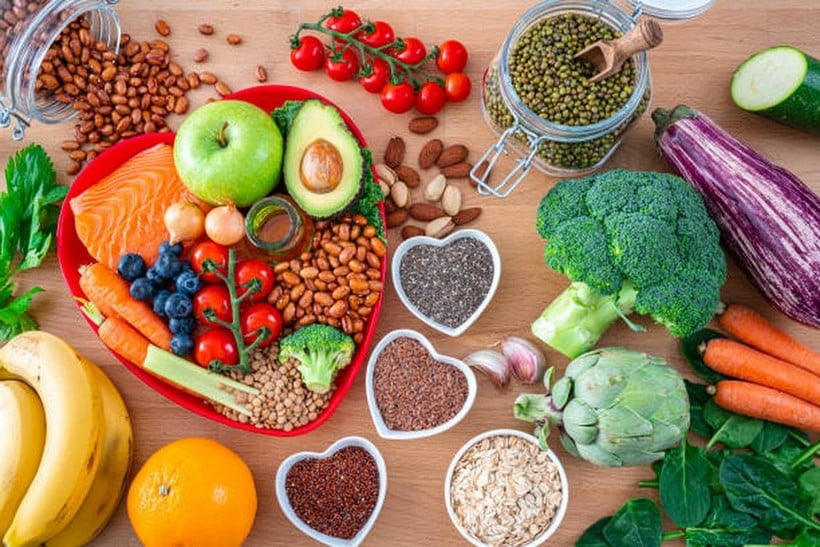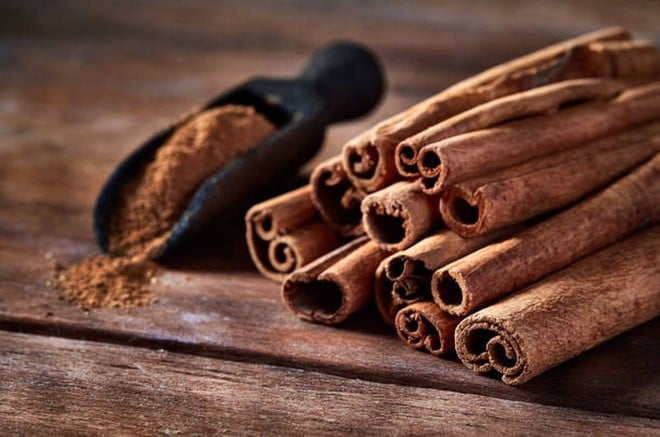The autumn diet needs to be adjusted appropriately to keep the body warm, strengthen the immune system and improve the ability to fight common diseases such as flu and sore throat.

Autumn marks the transition from hot summer to cold winter, with the characteristic of cool weather in the early morning and at night, and a large temperature difference between day and night. Air humidity decreases, making the skin dry and the throat sensitive and prone to inflammation. This is also the time when the body's resistance decreases due to having to constantly adjust to adapt to changes in climate.
Therefore, the autumn diet needs to be adjusted appropriately to keep the body warm, strengthen the immune system and improve the ability to fight common diseases such as flu, sore throat, dry cough or seasonal allergies.
To keep the body warm and effectively increase resistance, you should prioritize foods that meet the following criteria:
- Has thermal or warm properties, helps the body maintain warmth from the inside, avoiding uncomfortable cold phenomena.
- Contains high levels of vitamin C, A, and minerals such as zinc and selenium - nutrients that support immunity, while also helping to fight inflammation and natural antibacterial properties to prevent respiratory diseases.
- Rich in antioxidants, helps protect cells from damage, supports anti-aging and is suitable for the dry climate of autumn.
2. Foods to supplement in the fall
Choosing seasonal foods will help improve your health, beautify your skin and keep your energy high. Here are some foods you should add to your diet in the fall:
Foods that keep the body warm
Fresh ginger is a valuable ingredient in supporting health. It not only has the ability to stimulate blood circulation but also helps keep the abdomen warm effectively, especially useful in cold weather days. In addition, ginger also has anti-inflammatory properties, helping the body recover from unpleasant symptoms.
Garlic is a "superfood" that plays an important role in strengthening the immune system. In addition to this benefit, garlic is also known for its strong antibacterial properties, helping to protect the body against pathogens.
Spices like cinnamon, star anise, and cardamom have many significant health benefits. They not only help warm the lungs but also effectively help prevent colds, especially on chilly days.
Sweet potatoes and pumpkins are two essential nutritional foods, rich in beta-carotene and containing easily digestible starch. They provide important calories to the body, help maintain energy and ensure stable physiological functions, especially when the weather becomes harsh.

Foods that increase resistance
Oranges, tangerines, grapefruits and guavas are not only delicious fruits but also a rich source of vitamin C, which plays an important role in strengthening the immune system and helping the body effectively prevent common colds. These are essential foods to maintain stable health, especially during periods of changing weather.
Dark leafy greens, including spinach and kale, are also on the list of must-have foods. They provide a large amount of antioxidants along with iron, important nutrients that help the body stay healthy, improve resistance and support basic functions in the process of energy regeneration.
Mushrooms, including shiitake and shiitake mushrooms, are known for their rich vitamin D content, an essential element for boosting the immune system. In addition, mushrooms also provide other nutrients that help the body fight off environmental pathogens.
Nuts such as walnuts, almonds and pumpkin seeds are also excellent sources of nutrition. They are rich in omega-3, zinc and selenium, which are beneficial in improving overall health, protecting against common diseases and enhancing the body’s natural ability to heal. They are ideal choices to add to your daily diet to optimize your health.
Food groups that support the lungs and respiratory tract
Honey has long been known as an effective natural ingredient in soothing the throat, while also helping to reduce coughs thanks to its emollient and moisturizing properties.
White radish, with its ability to purify and clean the lungs, also effectively aids in removing phlegm, helping the respiratory system to function more smoothly.
In particular, honey combined with lemon not only enhances antibacterial ability but also contributes to improving resistance for the throat, protecting the body against harmful environmental agents.
3. Foods to limit in the fall
In addition to adding the right foods, we also need to pay attention to what foods should be limited in the fall. This is the time when the body is susceptible to dry skin, constipation, colds, allergies and respiratory diseases. Some foods can make this condition worse if consumed in excess.
Fried foods with lots of oil
Consuming too many fried or greasy foods can cause indigestion and increase the feeling of heaviness in the stomach, especially in cold weather which can easily make the body feel lethargic.
Spicy, hot food
Fall often comes with a change in climate, so eating too much spicy food can irritate the stomach and unbalance the digestive system.
Cold drinks
The low temperature this season will make drinking cold water easily cause discomfort to the respiratory system, increasing the risk of sore throat or cold.
Processed foods
Canned foods and fast foods often contain a lot of preservatives and little nutritional value, not suitable to provide the necessary energy for the body on cold days.
Foods high in sugar
Eating too many sweets can easily reduce resistance and cause weight gain, while the body in autumn needs a healthier and more balanced source of nutrition.
Cold fruits
Some fruits such as watermelon or kiwi are cold in nature; if eaten in large quantities in cold weather, they can affect digestive function, causing bloating or discomfort.

4. Note on diet according to physical condition
For the elderly, children, or people with underlying cardiovascular and respiratory diseases, they should focus on dishes such as steamed, stewed, and soup to aid digestion and keep the body warm effectively.
For people with hot body, prone to acne or internal heat, should adjust their diet by adding foods with mild cooling properties such as boiled vegetables, spinach soup, and remember to drink enough water to maintain balance for the body.
6. Combine nutrition with autumn lifestyle
To help your body adapt better to the autumn weather, you need to combine a reasonable diet with a healthy lifestyle. Daily light exercise such as walking, yoga or qigong not only helps improve your health but also supports blood circulation.
In addition, drinking enough water every day (about 1.5-2 liters) is very important, even when you do not feel thirsty, because the autumn weather is dry but does not cause sweating. Do not forget to ensure enough sleep and keep sensitive areas such as the neck, chest, and feet warm when sleeping to avoid catching a cold./.
Source: https://baolangson.vn/nhung-thuc-pham-nen-bo-sung-vao-mua-thu-de-giu-am-va-tang-suc-de-khang-5060709.html




![[Photo] Solemn opening of the 8th Congress of the Central Public Security Party Committee, term 2025-2030](https://vphoto.vietnam.vn/thumb/1200x675/vietnam/resource/IMAGE/2025/10/4/f3b00fb779f44979809441a4dac5c7df)


![[Photo] General Secretary To Lam attends the 8th Congress of the Central Public Security Party Committee](https://vphoto.vietnam.vn/thumb/1200x675/vietnam/resource/IMAGE/2025/10/4/79fadf490f674dc483794f2d955f6045)
![[Photo] Bustling Mid-Autumn Festival at the Museum of Ethnology](https://vphoto.vietnam.vn/thumb/1200x675/vietnam/resource/IMAGE/2025/10/4/da8d5927734d4ca58e3eced14bc435a3)
















































![[VIDEO] Summary of Petrovietnam's 50th Anniversary Ceremony](https://vphoto.vietnam.vn/thumb/402x226/vietnam/resource/IMAGE/2025/10/4/abe133bdb8114793a16d4fe3e5bd0f12)

![[VIDEO] GENERAL SECRETARY TO LAM AWARDS PETROVIETNAM 8 GOLDEN WORDS: "PIONEER - EXCELLENT - SUSTAINABLE - GLOBAL"](https://vphoto.vietnam.vn/thumb/402x226/vietnam/resource/IMAGE/2025/7/23/c2fdb48863e846cfa9fb8e6ea9cf44e7)






























Comment (0)